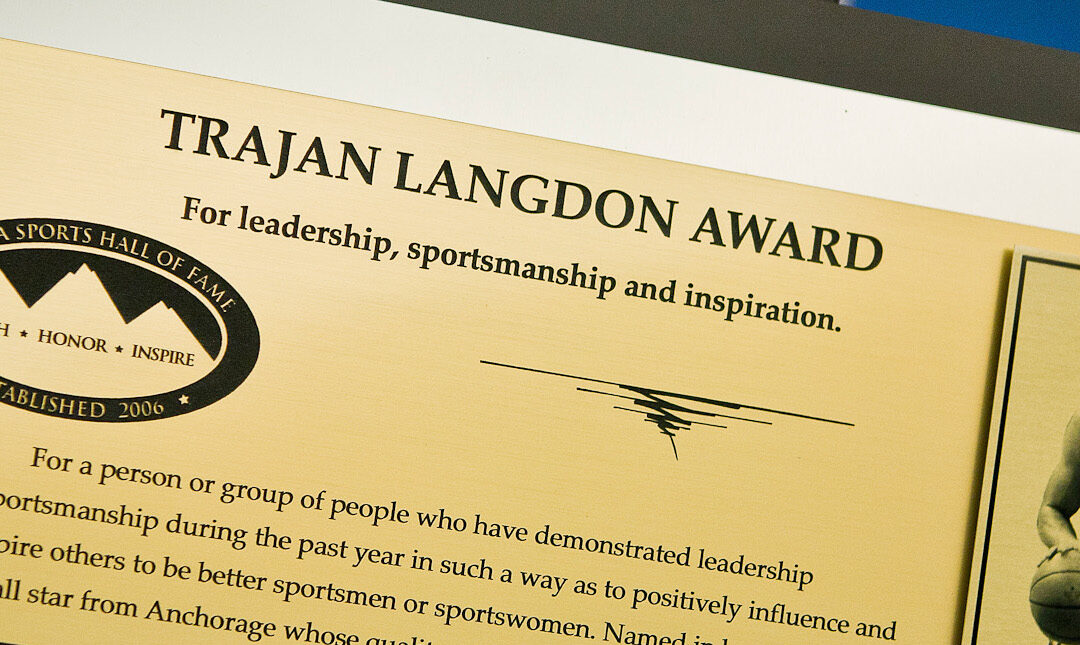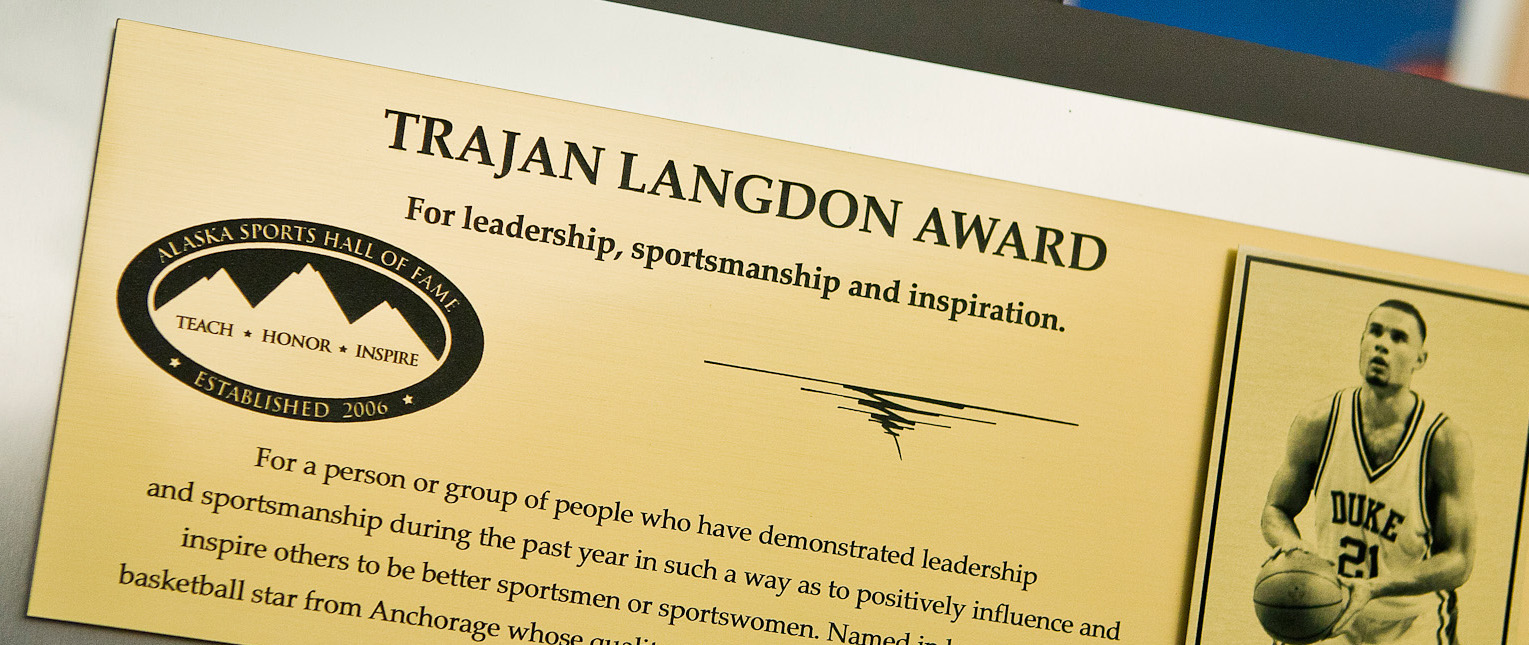
A mother who resumed her track career while still breastfeeding, a musher who rescued a rival in the middle of nowhere and a runner who halted his race to help a teammate are among the finalists for the Alaska Sports Hall of Fame’s Trajan Langdon Award.
The award honors leadership, sportsmanship and inspiration, and there’s no shortage of those qualities among the six finalists — three for the adult award, three for the youth award.
Winners will be announced April 5, along with the winners of five other Directors Awards – the Joe Floyd Award for significant and lasting contributions to Alaska through sport, and four Pride of Alaska athlete-of-the-year awards (men’s, women’s, boys and girls).
The Alaska Sports Hall of Fame will announce the winners at 3pm AST, on their Facebook Live in an awards show produced in partnership with Alaska’s News Source.
The winners will be honored at the Alaska Sports Hall of Fame ceremony and banquet April 27, at the Anchorage Museum along with the induction of the Class of 2023 – Kodiak coaching legend Joe Floyd, Fairbanks football player Reggie Tongue and Palmer basketball player Jessica Moore in the individuals category; Kikkan Randall’s 2018 Olympic gold medal in the moments category and March Madness Alaska/state high school basketball championships in the event category.
Adult nominees
Vanessa Aniteye
Aniteye ran to an NCAA Division II track championship after a two-year break from racing, a comeback that began while she was still breastfeeding her son and concluded with a national championship.
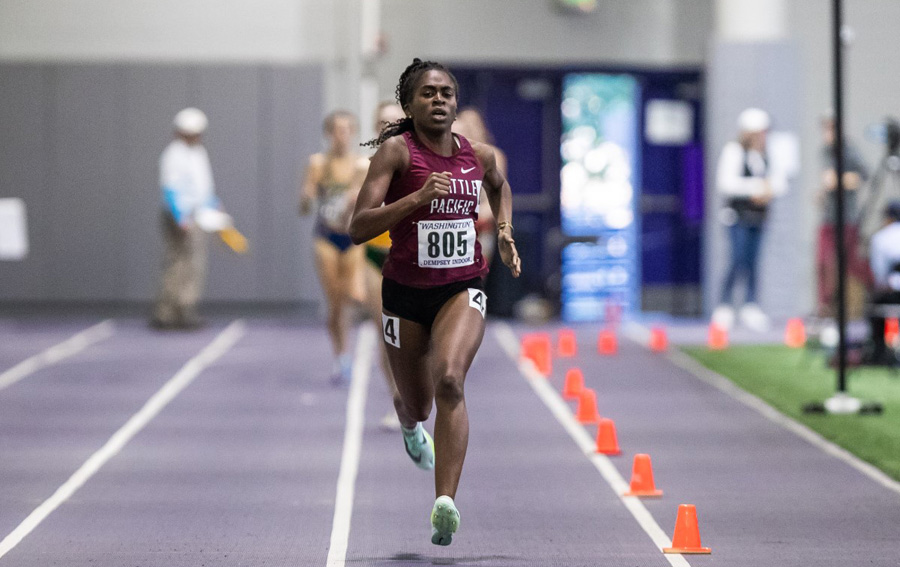
Vanessa Aniteye
Motherhood put her stellar career on hold – she was a six-time All-American during three years at UAA – but it didn’t end it as Aniteye first feared.
“For a couple months I was like, ‘Well no more track for me,’ until I realized that it doesn’t have to mean that it’s over. If you really want something, you can still do it,” Aniteye, a 24-year-old from Eagle River, told the Anchorage Daily News.
She and her husband moved to the Seattle area, and Aniteye worked on her own for more than a year to regain her fitness and form. She found a new home at Seattle Pacific, where coaches turned the 400-meter runner into an 800-meter runner. Nearly three years after she welcomed her son, she won the 800 finals at the NCAA Division II national championships with a personal-best time of 2:06.84.
Aniteye finished her career as a nine-time All-American and the Great Northwest Athletic Conference’s female track athlete of the year.
Hunter Keefe
Keefe, 23, made the shift from rival to rescuer to earn the Sportsmanship Award at the 51st Iditarod.

Hunter Keefe
The Knik musher was in a tight battle with Eddie Burke Jr. for Rookie of the Year honors when things went sideways for Burke midway through the race on the run from Grayling to Eagle Island.
Burke, who left Grayling with a two-hour lead over Keefe, fell asleep on his sled runners and tumbled to the ground. His 11 dogs kept going.
Left alone in the dark with Eagle Island about 18 miles away, Burke started walking. After about an hour another musher came along and called the race marshal to say Burke needed a snowmachine to pick him up. The two decided the weight of two men would be too much for one dog team, so Burke was left alone again.
Another hour later, Keefe came along. He didn’t hesitate to give Burke a ride.
“I didn’t really think twice,” Keefe told reporters later. “I let him on because I wouldn’t want to be walking at 20 below.”
Keefe hauled Burke for several miles before the snowmachine arrived. Burke, 33, went on to beat Keefe to Nome by some 15 hours to earn seventh place and $27,000.
Keefe placed 11th to win $21,100, and then pocketed another $3,000 when mushers voted to give him the Sportsmanship Award.
Christy Marvin and Robin Beebee
Partners in peril for the 306-mile Iditarod Trail Invitational, Marvin and Beebee broke the women’s ski record after helping each other endure extreme conditions.
Along the journey from Knik Lake to McGrath they passed up the comfort and safety of checkpoints and bivvy-camped on four out of six nights, including one when temperatures reportedly dropped to minus-40.
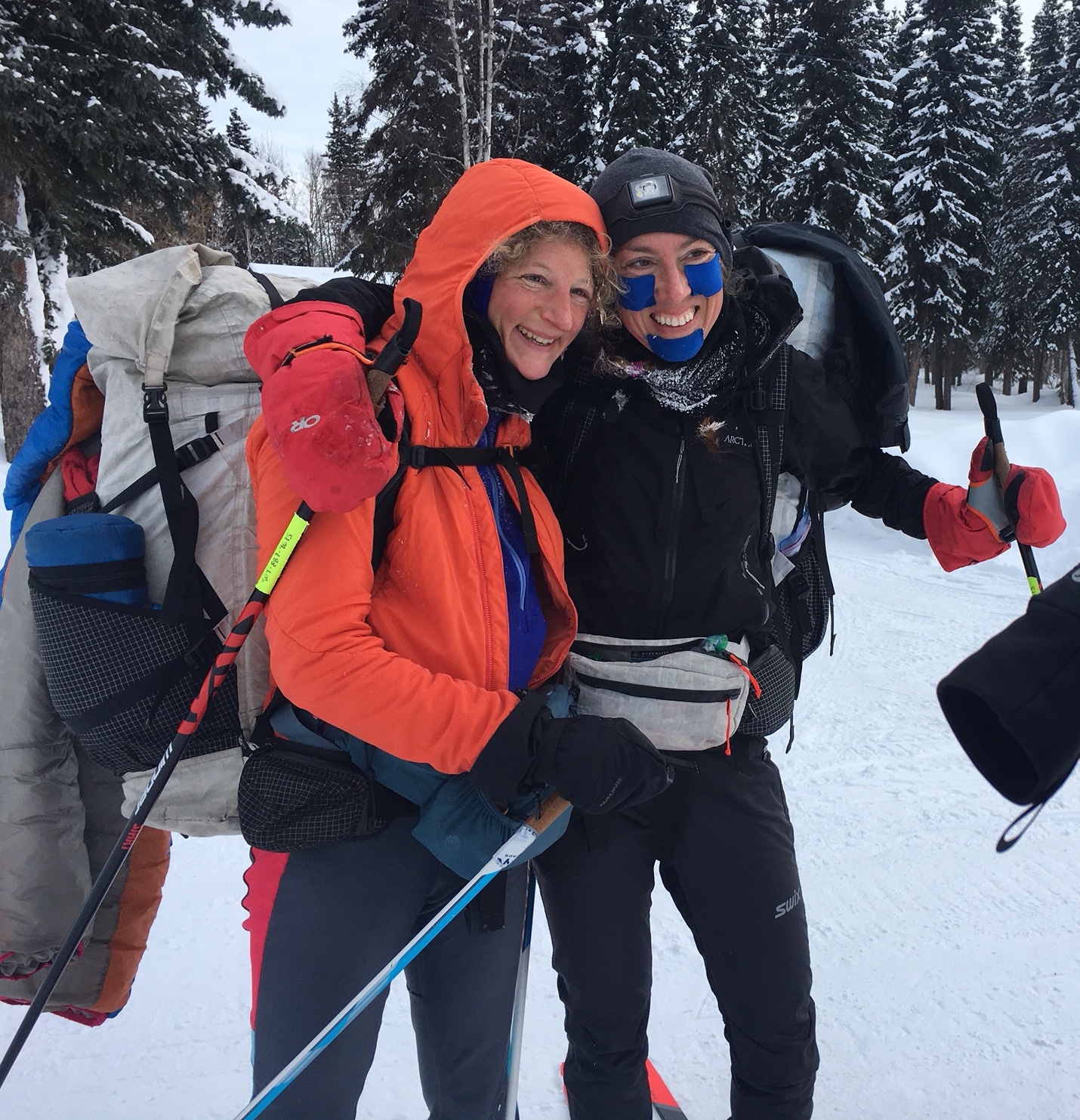
Robin Beebee and Christy Marvin at the finish (Photo by Matias Saari)
At the Puntilla Lake checkpoint 145 miles into the race, Beebee, 47, was tempted to quit but Marvin, 42, raised her spirits and encouraged her to continue. The next day Marvin led the climb up Rainy Pass while Beebee followed.
Relentless subzero temperatures and a lack of sleep caught up to Marvin on the final day. The women were 20 miles from the McGrath finish when a struggling Marvin told Beebee to go ahead without her. Beebee refused.
“The idea I was going to dump my partner … was crazy,” she said. Marvin rallied, and the two reached the finish in 6 days, 23 hours, 13 minutes. They cut 84 minutes from the previous record.
“She could have easily ditched me and gotten a faster time but instead she opted to be a friend,” Marvin said.
Youth nominees
Geremu Daggett and Colton Merriner
When Merriner collapsed a few meters away from the finish line at the state cross country championships, his Grace Christian cross country teammate Daggett stopped racing and started retreating.

Geremu Daggett helps teammate Colton Merriner across the finish line. Photos by Bryan Boyett/Alaska Sports Report
The senior turned back to retrieve the sophomore and drag him across the finish line. Two runners passed Daggett as he coaxed and carried Merriner, but preserving his spot in the results wasn’t his priority.
“I saw him fall, and I’m like, if I cross this finish line I can’t go back and help my teammate,” Daggett told reporters after the race. “So I stopped right there and ran back and helped him up.”
Daggett finished 15th to help Grace Christian win the team title by two points, but Merriner, who had pushed himself to the brink, was disqualified for not finishing under his own power.
“Unfortunately, based on the rules, the assisted athlete was DQ’d,” said race director Doug Herron. “The Grace kid acted in kindness and should be recognized for that.”
The younger runner was nearly unconscious at the end and said he doesn’t remember everything that happened. But he’ll never forget what his teammate did.
“Geremu modeled what a captain and an older teammate should act like, and so in that sense, it has showed me what I can be and should be when I’m an upperclassman,” he said.
Kenai Central High School/Zach Armstrong
Not long after his November diagnosis of leukemia, Kenai Central sophomore Zach Armstrong sat in an Anchorage hospital bed and texted a rallying cry to his basketball teammates.
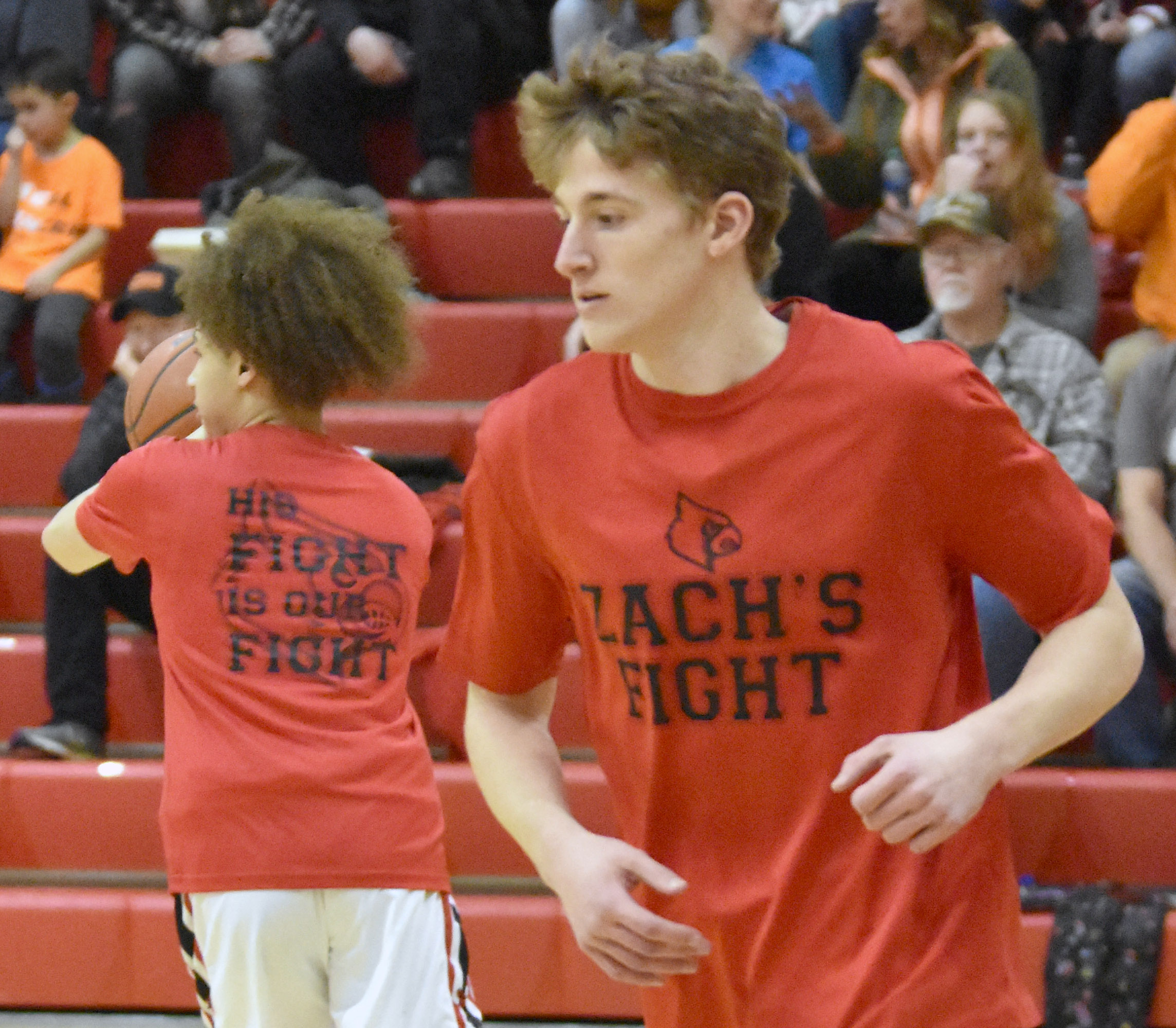
Kenai players warm up at the girls halftime wearing T-shirts referencing teammate Zach Armstrong. Zach’s brother Luke in the foreground. The game was a fundraiser for the Armstrong family. Photo by Jeff Helminiak/Peninsula Clarion.
The Kards were facing a Houston team that had beaten them by 48 points a year earlier, and Armstrong’s message helped inspire a last-second comeback — five points in the final 5.2 seconds that lifted Kenai to a 70-69 win.
A few weeks later, the high school and the community rallied for Zach, whose treatment will keep him in Anchorage for several months. At a fundraiser held in conjunction with a basketball doubleheader, more than $40,000 was raised. The football team put on a Hawaiian dinner, the volleyball team and cheerleaders held a balloon pop, and dozens of people donated items for a silent auction and raffle.
“His fight is our fight,” said the poster advertising the fundraiser.
Emily Robinson
Robinson, a 15-year-old musher from Nenana, repeated as the Junior Iditarod champion in February. It was her fifth victory in a row, a streak that included victories against older mushers, including top dogs like Brent Sass, Matt Hall and Jessie Holmes.
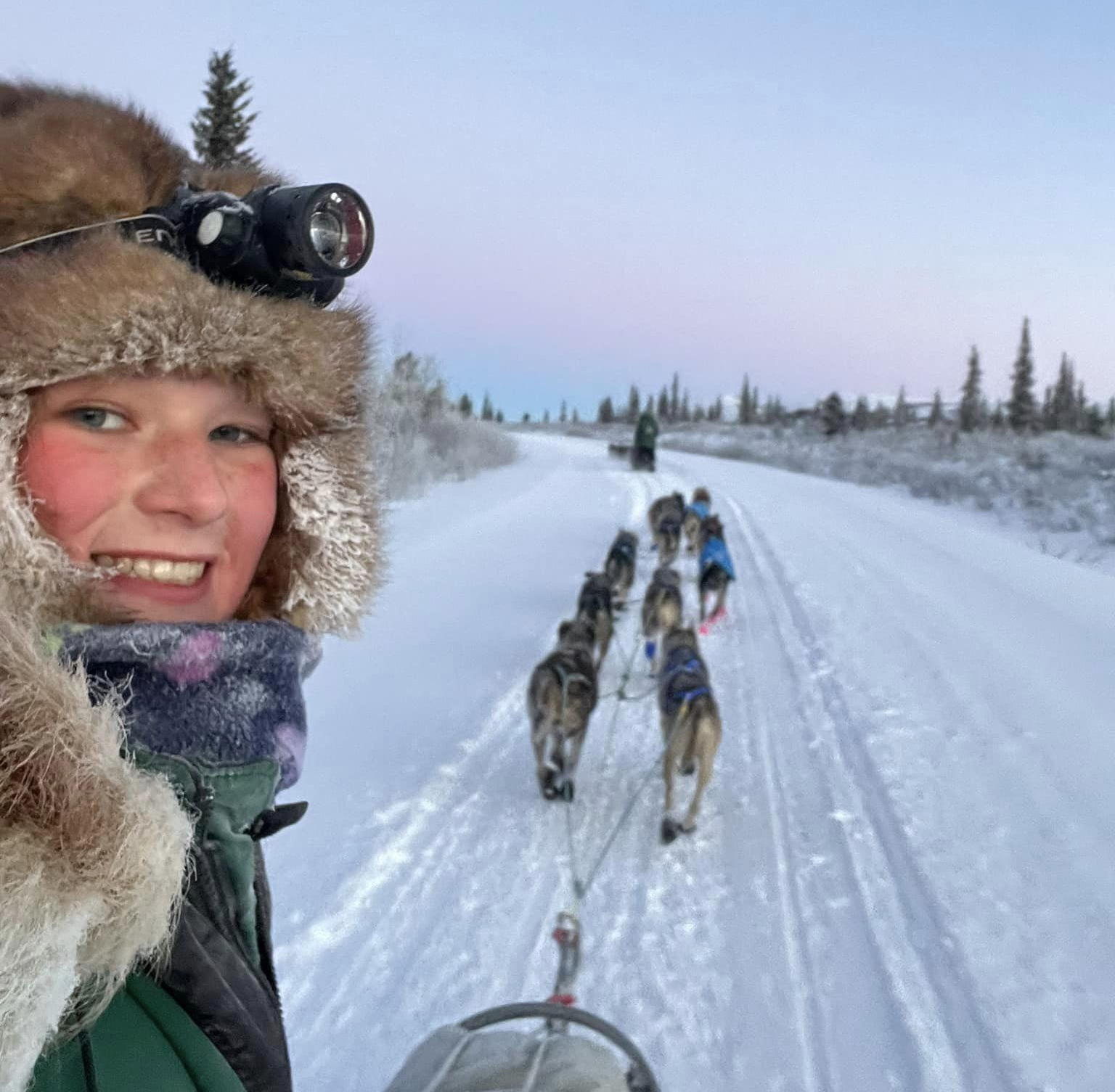
Emily Robinson and her team during a training run along the Denali Highway. Photo by Emily Robinson.
The win afforded Robinson a chance to speak at the Iditarod finishers’ banquet in Nome, where she captivated the audience with a five-minute speech about the Iditarod’s past, present and future.
After recalling Joe Redington Sr.’s long-ago dream to keep sled dogs relevant in rural Alaska after the advent of snowmachines, Robinson noted that this year’s 1-2-3 finish by a trio of Alaska Native mushers “says a lot about the success of Joe’s race in keeping dog mushing alive and the Alaska husky a healthy, working breed.”
But shrinking salmon populations are making it difficult for rural mushers to feed their dogs, she noted, and many mushers believe the Iditarod will be lucky to last another decade.
“Whatever the issues are, we need to come together in our shared love of working with one of the most amazing creatures on the planet,” she said. “We need to support races that still exist and make new ones, especially middle-distance races (that) are more accessible, more available and more fun.”
She ended with a challenge. “We need to revive and grow the state sport,” she said, bringing many in the applauding audience to their feet.
Also nominated
Adult – Tyson Gilbert, UAA (men’s basketball); Kim Nissen, Chugiak (auto racing)
Youth – Stephan Hafen, Wasilla (cross country)

